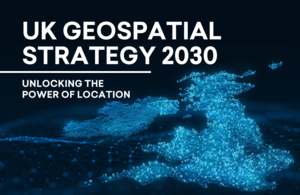From maps to apps: Geospatial Commission outlines goals for 2030
The UK Government has unveiled its new geospatial strategy, which includes a review of the Public Sector Geospatial Agreement (PSGA) and making the National Underground Asset Register (NUAR) fully operational by the end of 2025.
Published by the Geospatial Commission, UK Geospatial Strategy 2030 builds on the work set out in the 2020 paper, outlining a coordinated approach to unlock economic, social and environmental value from geospatial data
Geospatial Commission Chair, Sir Bernard Silverman, said: “Location-based insights have proven their enduring value again and again - during the coronavirus pandemic, tracking outbreaks across the country was critical to inform public health decisions. The power of location will continue to underpin solutions to our biggest challenges, including climate change, energy and economic growth.”
decisions. The power of location will continue to underpin solutions to our biggest challenges, including climate change, energy and economic growth.”
Broad ambitions outlined in the new strategy include a drive to increase the adoption of enabling technologies to accelerate geospatial innovation, greater use of geospatial applications and insights across the economy and measures to build confidence in the future geospatial ecosystem.
Key priorities
Specific priorities include a review of the Public Sector Geospatial Agreement (PSGA), which provides public sector bodies with access to geospatial data – to ensure it remains fit for purpose over its seven years.
This will include an evaluation of the data and services included in the agreement, its delivery model, and the foundations users have in place to make effective use of the data.
Another key priority is to make the National Underground Asset Register (NUAR) fully operational by the end of 2025. NUAR is a digital map of underground pipes and cables, which is currently a minimum viable product in North East England, Wales and London.
Once fully operational across England, Wales and Northern Ireland, the platform is expected to deliver at least £350 million per year of economic growth through increased efficiency, reduced asset strikes and reduced disruptions for people and businesses.
Further notable announcements in the strategy include:
- An ambition to host an international geospatial conference in 2024
- Publishing a report identifying the cross-cutting challenges and opportunities for location data in the health sector
- Publishing key findings from the earth observation pilot to set out how the public sector access to earth observation data and its innovative use can be supported
- Undertaking new research, with the Office for National Statistics and other partners, to understand the implications of geographic changes to where people work and land used for employment
- Sharing the Geospatial Commission’s findings for the public sector to make more informed decisions about electric vehicle charge point location
- A new Land Use Analysis Taskforce to bring together cutting edge data and scientific expertise to support land use decision making
The location data revolution
The UK’s minister for AI and Intellectual Property Viscount Camrose said: "Location data is fuelling the technological revolution. Geospatial applications are driving economic growth, improving public services and underpinning environmental recovery. This strategy positions the UK to fully realise geospatial benefits across the economy. We depend on a sense of place to understand the world - what is happening around us and in distant places. Location services are a crucial part of our everyday life.”
While the UK is well-placed to maximise the benefits of geospatial innovation - ranking second in the global geospatial readiness index - Camrose warns that future advantage in this field "is not assured."
“The geospatial ecosystem is being transformed and disrupted by advances in technology and there remains limited awareness of the full value of geospatial applications. We must make sure that the UK is equipped to face a future shaped by technological advancement," he said.






